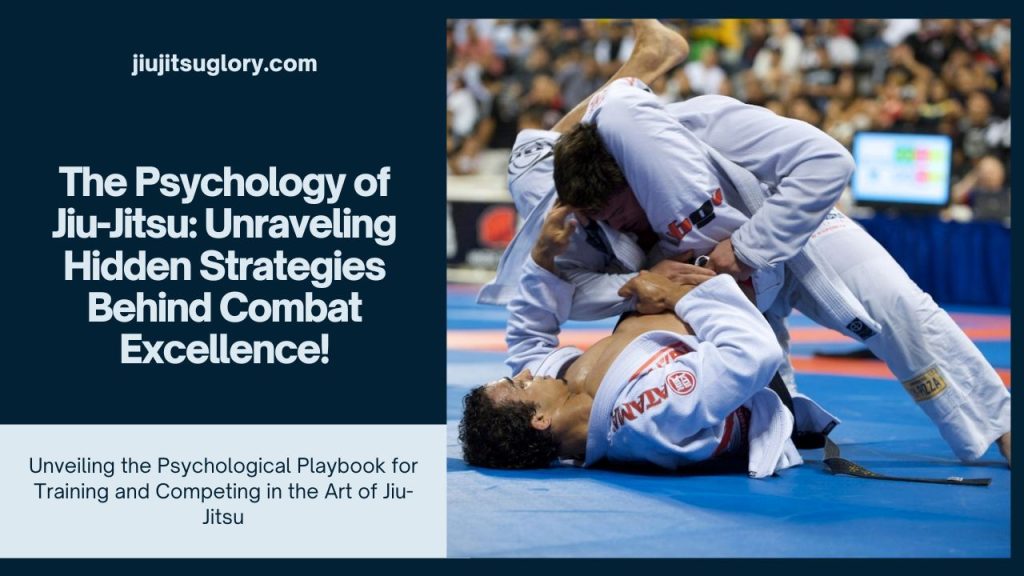The psychology of jiu-jitsu combat sport? Jiu-Jitsu is not just a physical activity; it’s a mental game, too.
Understanding the psychological aspects behind training and competing in Jiu-jitsu is crucial for practitioners to excel on the mats.
From managing nerves before a match to maintaining focus during intense training sessions, the mind plays a significant role in Jiu-jitsu’s success. Stay tuned!

The Right Mindset

In Jiu-Jitsu, having the right mindset is paramount. It’s not just about physical prowess but mental toughness and resilience.
Athletes must cultivate a mindset that embraces challenges, learns from failures, and stays determined in adversity.
Developing mental strength through consistent training and positive self-talk can make all the difference on the mats.
The Role of Confidence

Confidence is the cornerstone of success in Jiu-Jitsu.
Believing in oneself and one’s abilities can elevate performance and help overcome obstacles. However, building confidence takes time and effort.
It’s about setting realistic goals, celebrating small victories, and learning from setbacks.
With each accomplishment, confidence grows, empowering athletes to tackle more significant challenges with conviction.
Focus and Concentration

In the fast-paced world of Jiu-Jitsu, focus is critical. Whether executing a technique flawlessly or anticipating an opponent’s next move, maintaining concentration is vital.
Practitioners can sharpen their focus through mindfulness techniques, breathing exercises, and mental rehearsal.
By staying present and attentive on the mats, athletes can maximize their performance and minimize errors.
Handling Pressure and Stress

Competing in Jiu-Jitsu can be nerve-wracking, but learning to manage pressure is essential for success.
Techniques such as visualization and deep breathing can help calm pre-match jitters and keep athletes grounded during high-stakes situations.
By reframing pressure as a challenge rather than a threat, practitioners can harness its energy to fuel their performance and thrive under stress.
Understanding Emotions
Jiu-Jitsu is an emotional journey filled with highs and lows. From the euphoria of victory to the frustration of defeat, practitioners experience a wide range of emotions on the mats.
Understanding and regulating these emotions is critical to maintaining mental well-being and peak performance.
Athletes can cultivate emotional resilience and stay focused on their goals by acknowledging and accepting their feelings.
Psychological Training Techniques
Mental training is just as essential as physical training in Jiu-Jitsu. Visualization, or mentally rehearsing techniques and scenarios, can enhance muscle memory and confidence.
Similarly, mindfulness practices such as meditation and body scanning can improve focus and reduce anxiety.
Setting achievable goals and using positive self-talk can also boost motivation and self-belief.
The Coach-Athlete Relationship
Coaches play a vital role in shaping the psychological landscape of Jiu-Jitsu athletes.
By providing support, guidance, and constructive feedback, coaches can help athletes develop confidence, resilience, and mental fortitude.
Building a trusting and communicative relationship between coach and athlete fosters a positive training environment where athletes feel valued and empowered to reach their full potential.
Mental Health in Jiu-Jitsu
While Jiu-Jitsu offers numerous physical and mental benefits, it’s essential to recognize and address the mental health challenges that practitioners may face.
Burnout, overtraining, and performance anxiety are common issues that can affect athletes’ well-being and performance.
Creating a supportive community where athletes feel comfortable discussing their struggles and seeking help is crucial for promoting mental health and overall wellness in Jiu-Jitsu.
Conclusion
Understanding the psychology behind Jiu-Jitsu is crucial to unlocking one’s full potential as a combat sports athlete.
Practitioners can develop a resilient mindset, sharpen mental skills, and build supportive relationships. These skills help them navigate the challenges of training and competition with confidence and grace.
As Jiu-Jitsu evolves, keeping pace with the psychological factors that shape success on the mats is essential.


